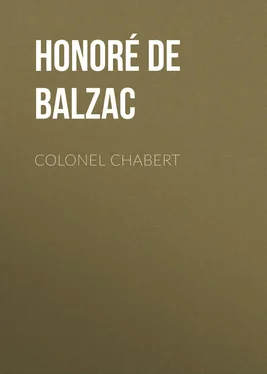Honoré Balzac - Colonel Chabert
Здесь есть возможность читать онлайн «Honoré Balzac - Colonel Chabert» — ознакомительный отрывок электронной книги совершенно бесплатно, а после прочтения отрывка купить полную версию. В некоторых случаях можно слушать аудио, скачать через торрент в формате fb2 и присутствует краткое содержание. Жанр: literature_19, foreign_antique, foreign_prose, на английском языке. Описание произведения, (предисловие) а так же отзывы посетителей доступны на портале библиотеки ЛибКат.
- Название:Colonel Chabert
- Автор:
- Жанр:
- Год:неизвестен
- ISBN:нет данных
- Рейтинг книги:5 / 5. Голосов: 1
-
Избранное:Добавить в избранное
- Отзывы:
-
Ваша оценка:
- 100
- 1
- 2
- 3
- 4
- 5
Colonel Chabert: краткое содержание, описание и аннотация
Предлагаем к чтению аннотацию, описание, краткое содержание или предисловие (зависит от того, что написал сам автор книги «Colonel Chabert»). Если вы не нашли необходимую информацию о книге — напишите в комментариях, мы постараемся отыскать её.
Colonel Chabert — читать онлайн ознакомительный отрывок
Ниже представлен текст книги, разбитый по страницам. Система сохранения места последней прочитанной страницы, позволяет с удобством читать онлайн бесплатно книгу «Colonel Chabert», без необходимости каждый раз заново искать на чём Вы остановились. Поставьте закладку, и сможете в любой момент перейти на страницу, на которой закончили чтение.
Интервал:
Закладка:
Honoré de Balzac
Colonel Chabert
COLONEL CHABERT
“HULLO! There is that old Box-coat again!”
This exclamation was made by a lawyer’s clerk of the class called in French offices a gutter-jumper – a messenger in fact – who at this moment was eating a piece of dry bread with a hearty appetite. He pulled off a morsel of crumb to make into a bullet, and fired it gleefully through the open pane of the window against which he was leaning. The pellet, well aimed, rebounded almost as high as the window, after hitting the hat of a stranger who was crossing the courtyard of a house in the Rue Vivienne, where dwelt Maitre Derville, attorney-at-law.
“Come, Simonnin, don’t play tricks on people, or I will turn you out of doors. However poor a client may be, he is still a man, hang it all!” said the head clerk, pausing in the addition of a bill of costs.
The lawyer’s messenger is commonly, as was Simonnin, a lad of thirteen or fourteen, who, in every office, is under the special jurisdiction of the managing clerk, whose errands and billets-doux keep him employed on his way to carry writs to the bailiffs and petitions to the Courts. He is akin to the street boy in his habits, and to the pettifogger by fate. The boy is almost always ruthless, unbroken, unmanageable, a ribald rhymester, impudent, greedy, and idle. And yet, almost all these clerklings have an old mother lodging on some fifth floor with whom they share their pittance of thirty or forty francs a month.
“If he is a man, why do you call him old Box-coat?” asked Simonnin, with the air of a schoolboy who has caught out his master.
And he went on eating his bread and cheese, leaning his shoulder against the window jamb; for he rested standing like a cab-horse, one of his legs raised and propped against the other, on the toe of his shoe.
“What trick can we play that cove?” said the third clerk, whose name was Godeschal, in a low voice, pausing in the middle of a discourse he was extemporizing in an appeal engrossed by the fourth clerk, of which copies were being made by two neophytes from the provinces.
Then he went on improvising:
“ But, in his noble and beneficent wisdom, his Majesty, Louis the Eighteenth – (write it at full length, heh! Desroches the learned – you, as you engross it!) — when he resumed the reins of Government, understood – (what did that old nincompoop ever understand?) — the high mission to which he had been called by Divine Providence! – (a note of admiration and six stops. They are pious enough at the Courts to let us put six) — and his first thought, as is proved by the date of the order hereinafter designated, was to repair the misfortunes caused by the terrible and sad disasters of the revolutionary times, by restoring to his numerous and faithful adherents – (‘numerous’ is flattering, and ought to please the Bench) — all their unsold estates, whether within our realm, or in conquered or acquired territory, or in the endowments of public institutions, for we are, and proclaim ourselves competent to declare, that this is the spirit and meaning of the famous, truly loyal order given in – Stop,” said Godeschal to the three copying clerks, “that rascally sentence brings me to the end of my page. – Well,” he went on, wetting the back fold of the sheet with his tongue, so as to be able to fold back the page of thick stamped paper, “well, if you want to play him a trick, tell him that the master can only see his clients between two and three in the morning; we shall see if he comes, the old ruffian!”
And Godeschal took up the sentence he was dictating – “ given in – Are you ready?”
“Yes,” cried the three writers.
It all went all together, the appeal, the gossip, and the conspiracy.
“ Given in – Here, Daddy Boucard, what is the date of the order? We must dot our i ’s and cross our t ’s, by Jingo! it helps to fill the pages.”
“By Jingo!” repeated one of the copying clerks before Boucard, the head clerk, could reply.
“What! have you written by Jingo ?” cried Godeschal, looking at one of the novices, with an expression at once stern and humorous.
“Why, yes,” said Desroches, the fourth clerk, leaning across his neighbor’s copy, “he has written, ‘ We must dot our i’s ’ and spelt it by Gingo !”
All the clerks shouted with laughter.
“Why! Monsieur Hure, you take ‘By Jingo’ for a law term, and you say you come from Mortagne!” exclaimed Simonnin.
“Scratch it cleanly out,” said the head clerk. “If the judge, whose business it is to tax the bill, were to see such things, he would say you were laughing at the whole boiling. You would hear of it from the chief! Come, no more of this nonsense, Monsieur Hure! A Norman ought not to write out an appeal without thought. It is the ‘Shoulder arms!’ of the law.”
“ Given in – in ?” asked Godeschal. – “Tell me when, Boucard.”
“June 1814,” replied the head clerk, without looking up from his work.
A knock at the office door interrupted the circumlocutions of the prolix document. Five clerks with rows of hungry teeth, bright, mocking eyes, and curly heads, lifted their noses towards the door, after crying all together in a singing tone, “Come in!”
Boucard kept his face buried in a pile of papers — broutilles (odds and ends) in French law jargon – and went on drawing out the bill of costs on which he was busy.
The office was a large room furnished with the traditional stool which is to be seen in all these dens of law-quibbling. The stove-pipe crossed the room diagonally to the chimney of a bricked-up fireplace; on the marble chimney-piece were several chunks of bread, triangles of Brie cheese, pork cutlets, glasses, bottles, and the head clerk’s cup of chocolate. The smell of these dainties blended so completely with that of the immoderately overheated stove and the odor peculiar to offices and old papers, that the trail of a fox would not have been perceptible. The floor was covered with mud and snow, brought in by the clerks. Near the window stood the desk with a revolving lid, where the head clerk worked, and against the back of it was the second clerk’s table. The second clerk was at this moment in Court. It was between eight and nine in the morning.
The only decoration of the office consisted in huge yellow posters, announcing seizures of real estate, sales, settlements under trust, final or interim judgments, – all the glory of a lawyer’s office. Behind the head clerk was an enormous room, of which each division was crammed with bundles of papers with an infinite number of tickets hanging from them at the ends of red tape, which give a peculiar physiognomy to law papers. The lower rows were filled with cardboard boxes, yellow with use, on which might be read the names of the more important clients whose cases were juicily stewing at this present time. The dirty window-panes admitted but little daylight. Indeed, there are very few offices in Paris where it is possible to write without lamplight before ten in the morning in the month of February, for they are all left to very natural neglect; every one comes and no one stays; no one has any personal interest in a scene of mere routine – neither the attorney, nor the counsel, nor the clerks, trouble themselves about the appearance of a place which, to the youths, is a schoolroom; to the clients, a passage; to the chief, a laboratory. The greasy furniture is handed down to successive owners with such scrupulous care, that in some offices may still be seen boxes of remainders , machines for twisting parchment gut, and bags left by the prosecuting parties of the Chatelet (abbreviated to Chlet ) – a Court which, under the old order of things, represented the present Court of First Instance (or County Court).
Читать дальшеИнтервал:
Закладка:
Похожие книги на «Colonel Chabert»
Представляем Вашему вниманию похожие книги на «Colonel Chabert» списком для выбора. Мы отобрали схожую по названию и смыслу литературу в надежде предоставить читателям больше вариантов отыскать новые, интересные, ещё непрочитанные произведения.
Обсуждение, отзывы о книге «Colonel Chabert» и просто собственные мнения читателей. Оставьте ваши комментарии, напишите, что Вы думаете о произведении, его смысле или главных героях. Укажите что конкретно понравилось, а что нет, и почему Вы так считаете.












